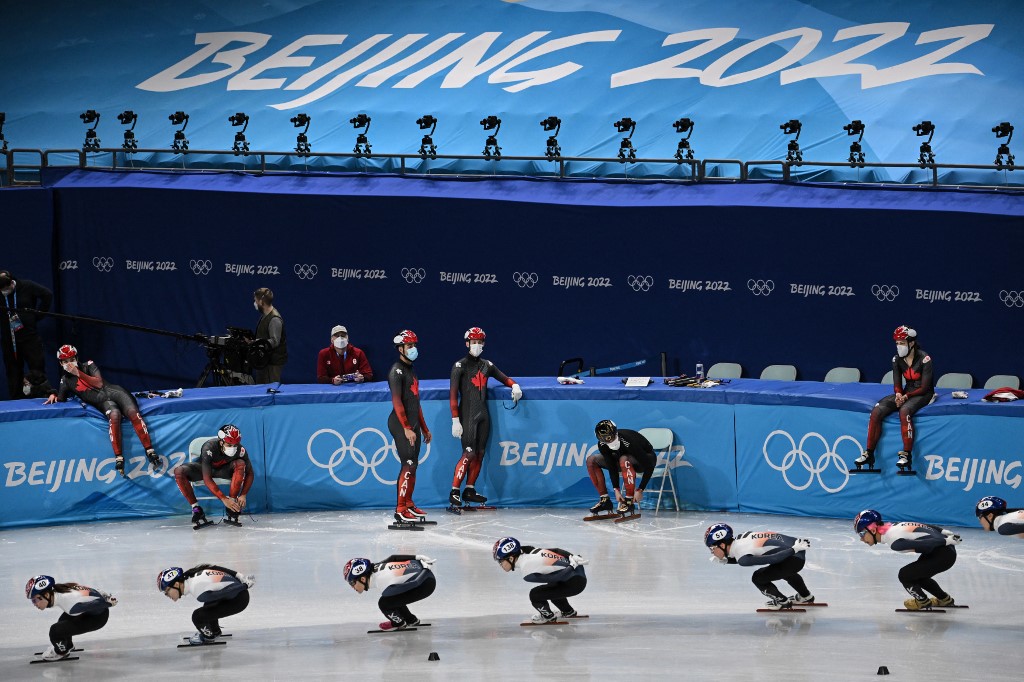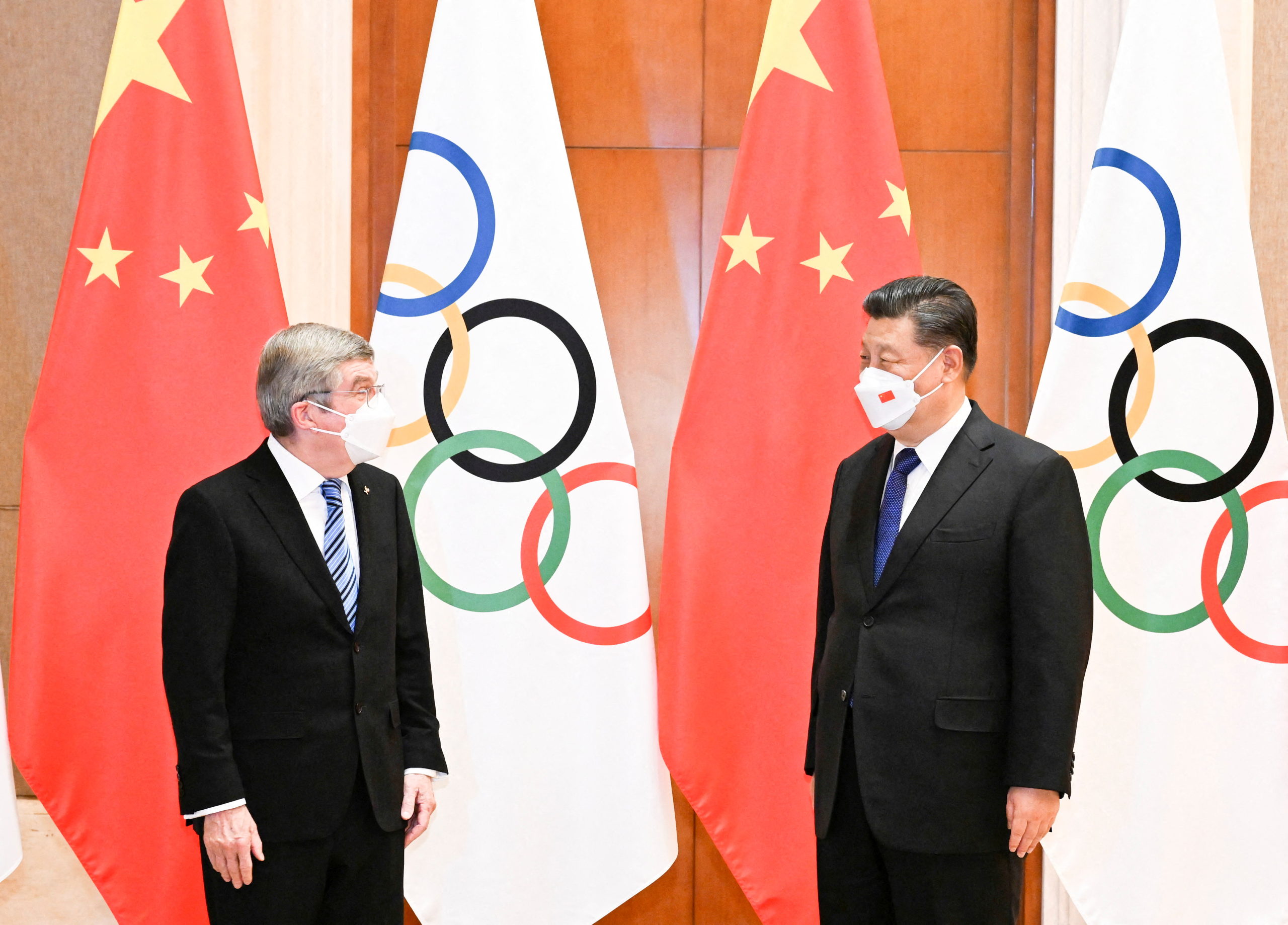
Canada’s and South Korea’s short track speed skaters take part in a training session at the Capital Indoor Stadium in Beijing on January 31, 2022 ahead of the Beijing 2022 Winter Olympics Games. (Photo by Anne-Christine POUJOULAT / AFP)
The Beijing Olympics will “change the scale of winter sports forever,” IOC president Thomas Bach said Thursday, on the eve of a Games beset by concerns about human rights and COVID.
China’s ruling Communist Party hopes the Olympics will be a soft-power success but they have been overshadowed by diplomatic boycotts, fears for tennis player Peng Shuai’s safety, warnings about surveillance and the environmental impact.
The Games, which launch with an opening ceremony on Friday at Beijing’s “Bird’s Nest” stadium and last until February 20, are taking place in one of the driest regions of China and rely almost entirely on man-made snow.
American snowboarder Jamie Anderson, a reigning two-time Olympic champion, said on Wednesday she had been scared trying out the slopestyle course and its artificially made surface, calling it “bulletproof ice.”
China has little tradition of winter sports but has consistently said that staging the Olympics will help inspire 300 million people in the world’s most populous nation to “engage” in ski and ice pursuits.
Bach said that goal had already been exceeded.
“Today we can say: China is a winter sport country,” he told an International Olympic Committee meeting in the capital.
“Everything is in place for a safe and successful Winter Olympics,” Bach added.
COVID in bubble

Chinese President Xi Jinping meets with International Olympic Committee (IOC) President Thomas Bach at the Diaoyutai State Guesthouse in Beijing, China January 25, 2022. Picture taken January 25, 2022. Zhang Ling/Xinhua via REUTERS
China and the IOC hope that the rancor that has clouded the build-up will be relegated to the sidelines once the action gets under way.
The sport started on Wednesday with curling and there was a smattering of masked fans at the so-called “Ice Cube,” the striking venue known as the “Water Cube” when Beijing hosted the 2008 Summer Games, which was seen then as China’s coming-out party on the world stage.
Women’s hockey is also now under way.
These Games are taking place in a vast “closed loop” bubble to thwart the coronavirus, with the nearly 3,000 athletes and tens of thousands of support staff, volunteers and media cut off from Beijing’s general population.
China, where the virus emerged in late 2019, has pursued a no-nonsense zero-Covid policy nationwide and adopted the same approach to the Games, with everyone cocooned inside the bubble having daily tests and required to wear a mask at all times.
There have been nearly 250 Covid cases within the bubble and 11 people hospitalized.
Dr Brian McCloskey, chairman of the medical expert panel for Beijing 2022, said none were seriously ill.
COVID is not the only challenge.
The United States, Britain, Canada and Australia are among countries staging a diplomatic boycott over rights concerns, with the fate of China’s Muslim Uyghur minority of particular concern.
Washington accuses China of perpetrating genocide in the region of Xinjiang. China warned that the US would “pay the price” for its diplomatic boycott.
Athletes of the boycotting nations will still compete.
There is also concern for tennis player Peng, a former Grand Slam champion doubles player who was not heard from for nearly three weeks after alleging that a high-ranking Chinese politician had sexually assaulted her.
Peng reappeared in public and conducted a video call in November with Bach, who is supposed to meet her in person while he is in Beijing. But it remains unclear how free and safe she really is.
Hanyu v Chen
FILE–Yuzuru Hanyu of Japan.News Agency via REUTERS
The Games will be held in three zones. In addition to downtown Beijing, the two other areas are outside the capital and will rely on artificially-made snow to cover what would otherwise be brown mountainsides.
Eileen Gu has captivated China and looks set to be the face of the Games.
The 18-year-old grade-A student, born and raised in California, switched from the United States to represent China and is hot favorite in freestyle skiing.
There will also be intense interest in Chloe Kim, the American snowboarder who melted hearts when she won gold aged 17 at the Pyeongchang Olympics in 2018.
Japan’s Yuzuru Hanyu is looking to make it a hat-trick of figure-skating Olympic titles but faces a stern challenge from his American rival Nathan Chen.
Norway are tipped to top the medals table for a second Winter Olympics in a row.

